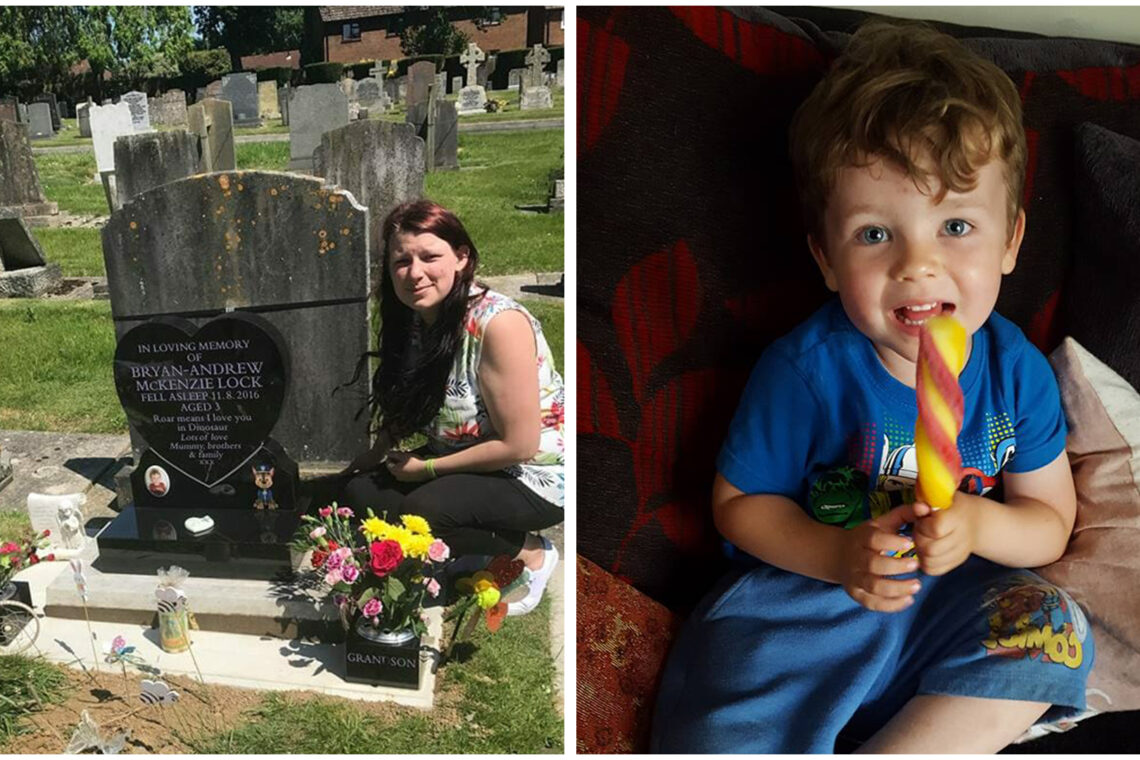
In 2016, a tragic event unfolded for a young mother, Jasmine Shortland, that would forever change her life. Her 3-year-old son, Bryan-Andrew, had contracted chickenpox, a common illness that most people get in childhood. At first, it seemed like just another routine case. Bryan-Andrew, though a bit uncomfortable with a sore neck and some swelling, appeared to be in good health overall. His mother, who was only 23 years old at the time, did not anticipate anything beyond mild symptoms for her son.
Jasmine had another child, Ivan, who was still an infant. Not wanting her youngest to catch the virus, she decided to take Bryan-Andrew and his older brother, Austin, to their grandmother’s house for a while. Austin had already gone through chickenpox without any complications, and Jasmine assumed the same would happen with Bryan-Andrew. However, she could never have imagined how everything would quickly take a devastating turn.

The morning after dropping off her sons, Jasmine received the news that would haunt her forever. Bryan-Andrew had not woken up. Despite the best efforts of his grandmother to rouse him, the little boy was unresponsive. Paramedics were called to the scene, but by the time they arrived, it was too late. Bryan-Andrew was pronounced dead.
Jasmine was left in a state of utter shock. She vividly remembered the previous evening, when her son had been his usual playful self—laughing, running around, and joking with his brothers. His sudden death made no sense to her. The last words he had spoken to her were “I love you,” and she would never be able to forget them.
As a mother, the grief and disbelief were overwhelming. How could this happen to a child who had seemed so healthy just hours earlier? With no apparent signs of severe illness, the family could not comprehend what had led to such an unexpected and tragic loss. It wasn’t until weeks later that the cause of Bryan-Andrew’s death was revealed, and it was something that no one could have predicted.

Doctors discovered that Bryan-Andrew had contracted a rare and particularly aggressive strain of streptococcus A septicaemia, also known as A strep. This infection is capable of causing sepsis, a severe condition in which the body’s response to an infection causes widespread inflammation, potentially leading to organ failure. Unfortunately, Bryan-Andrew’s body was unable to fight off the infection, which quickly spread and became fatal.
The doctors explained that Bryan-Andrew’s infection had likely been triggered by him scratching his chickenpox blisters. While chickenpox itself is often mild, scratching the blisters can allow harmful bacteria to enter the body, leading to potentially deadly infections like A strep. What was most shocking, however, was that the infection had shown no typical signs. Bryan-Andrew had not developed any rashes or unusual symptoms that might have indicated a serious problem. He simply appeared to have the usual mild chickenpox, but the bacteria were silently wreaking havoc on his small body.

Jasmine’s pain was compounded by the knowledge that her son had been so young and vulnerable, unable to fight off an infection that was both rare and silent. In an effort to find some comfort amidst her loss, she found solace in the thought that Bryan-Andrew had passed peacefully in his sleep, without having to endure any suffering. Still, the loss of her child was a wound that would never fully heal.
As if the tragedy of losing her son wasn’t enough, Jasmine’s grief was compounded by another devastating blow. After Bryan-Andrew’s death, she discovered that she was pregnant again. The intense emotional stress of the situation took a heavy toll on her body, and she suffered a miscarriage. The trauma was so severe that it almost cost her life as well. She lost a significant amount of blood, and the medical staff at the hospital later told her that someone had been watching over her that day. Jasmine believed it was her late son, Bryan-Andrew, guiding her through that dark moment.

Though the experience was shattering, Jasmine emerged from it determined to help prevent similar tragedies from occurring to other families. She became an advocate for raising awareness about the dangers of chickenpox and its potential complications, particularly the risk of secondary infections like A strep. This rare and aggressive infection can often go unnoticed because it does not always present the typical symptoms one might associate with a severe illness.
Jasmine’s message to other parents is simple but vital: be vigilant. While chickenpox is typically a mild illness, it can sometimes lead to life-threatening complications. Parents should be aware of the possibility that a simple scratch could allow bacteria to enter the body and cause infections like A strep. In addition, she encourages parents to seek medical advice if their child’s condition seems to worsen or if they notice anything out of the ordinary.

She also stresses the importance of staying informed about the risks of childhood diseases and the potential for rare infections that can cause severe health problems. Through her grief and loss, Jasmine has become a voice for caution, hoping to educate others about the dangers that can accompany seemingly harmless illnesses. Her message serves as a reminder that no child is immune from the unexpected, and parents should always be aware of the possible risks, even with common illnesses like chickenpox.
By sharing her story, Jasmine hopes that no other family will have to endure the unimaginable pain she and her loved ones experienced. While her son’s life was tragically cut short, his legacy lives on in the awareness and understanding that Jasmine is working to spread, ensuring that other parents are more prepared to protect their children from the unseen dangers that can sometimes lurk beneath the surface of even the most ordinary illnesses.